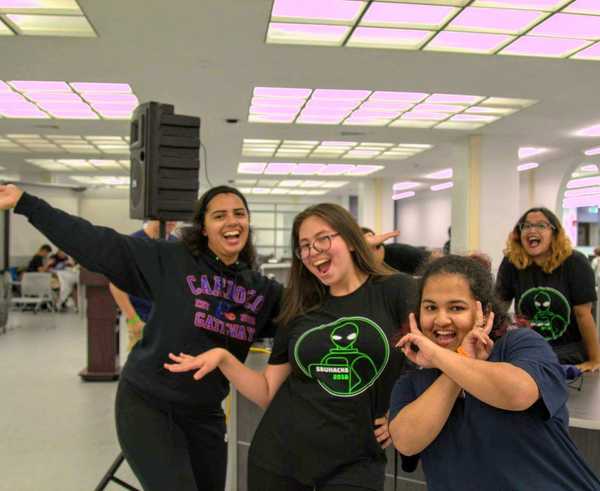Girl, introvert, American, Croatian, writer, Ravenclaw, geeky, musical. Those are only a few ways I would describe myself.
I've always felt comfortable with labeling myself. Knowing who I am gives me a sense of security. But I used to be wary of personality tests such as the Myers Briggs Type Indicator or the Enneagram. In a world of millions of people, how can everyone fit into 16 or 9 (depending on which test you take) personality types?
One day, my friend made me take the MBTI test, and when I got my result, suddenly my viewpoint changed.
For some context, when you get your MBTI result, you get a page describing all the facets of your personality type.
When I read the INFJ page, I felt like I was reading a biography. It was scary how much it applied to my life. I couldn't believe that there were other people who saw the world in the exact way that I did.
The way that the MBTI works is that you get a four-letter type - Extrovert (E) or Introvert (I), Intuitive (N) or Sensing (S), Thinking (T) or Feeling (F), and Perceiving (P) or Judging (J).
So my type would break down into introverted, intuitive, feeling, and judging. But this doesn't necessarily mean that I don't have any extroversion, sensing, thinking, or perception. It just means the other four are the dominant functions.
It's much more complex than most people make it out to be.
I'm not going to go too into it, but if you want a good breakdown of all the cognitive functions, here's a link.
The more I researched into the subject, the more hidden links I found between myself and the INFJ personality type. For example, almost all of my favorite characters and/or the characters I most connected to from various TV shows and books were INFJs.
But not everyone feels so connected to their personality type. I have a friend that took the test multiple times and she kept getting different answers every time. And that's valid too. Personalities can grow and change, so personality types follow suit.
The main criticism I've heard for MBTI is that it puts you into a box, but the way I see it, it explains and helps you understand what's already there.
Not every INFJ is the same, but we all have very similar lenses with which we see and understand the world.
It's helped me understand my friends too. There are some behaviors that I'd see in friends that I'd interpret as them being mad at me or ignoring me, but once I read their type descriptions, I found that those behaviors weren't something negative, they were just a part of their personalities.
But I must admit, I'm pretty sure that I'm biased. INFJ is the rarest personality type, with INFJs only making up less than 1% of the world's population. The INFJ personality page boasts that "As Diplomats, they have an inborn sense of idealism and morality, but what sets them apart is the accompanying Judging (J) trait – INFJs are not idle dreamers, but people capable of taking concrete steps to realize their goals and make a lasting positive impact."
Of course, reading that description, you want to believe that about yourself. I would love to believe that I'm some sort of magical, unicorn Jesus that can see right through you. This is why I took a step back from MBTI and delved into the Enneagram.
The Enneagram type indicator is comprised of nine personality types, their names just being a number (1-9) that is randomly assigned to them. The types are characterized by a few main traits which have both strengths and weaknesses.
I initially got into researching this because a musician I love very much, Sleeping At Last, is making a series of songs about the Enneagram - one for each personality type.
The second song in the series, "Two," really opened my eyes. The 2 is the warm, care-giving type. The song takes the listener on a journey from the narrator constantly sacrificing themselves in order to make others happy to them learning to love themselves "without a single string attached."
Though my type's not the 2 (I'm a 9), it stuck with me not only because it's a beautiful song, but because I was fascinated with the internal struggle. MBTI is great for highlighting someone's best qualities. But the Enneagram tells you the good AND the bad.
Also, the Enneagram doesn't claim to be all-encompassing. It focuses on a huge aspect of your personality and how it can positively and negatively impact your life.
By reading through some of the descriptions of the types, I was reminded of some of the personalities of my friends.
One of my friends was clearly a 2. Realizing this has been instrumental in helping me understand my friend and the way that she operates and treats her relationships. In some of our deepest conversations, I've brought up the subject of her caring about other people more than herself, and it's really led to some breakthroughs in a struggle she's been having recently.
If I hadn't discovered the Enneagram, I don't know how long it would have taken me to realize that.
So in conclusion, I'm not saying that personality types can completely define someone's personality, but for some, they can be a useful tool for understanding yourself and others. They shouldn't be entirely discounted as pseudo-science.
These labels aren't for everyone; but for some, they can really make a difference in their relationship with their loved ones and with themselves.



















